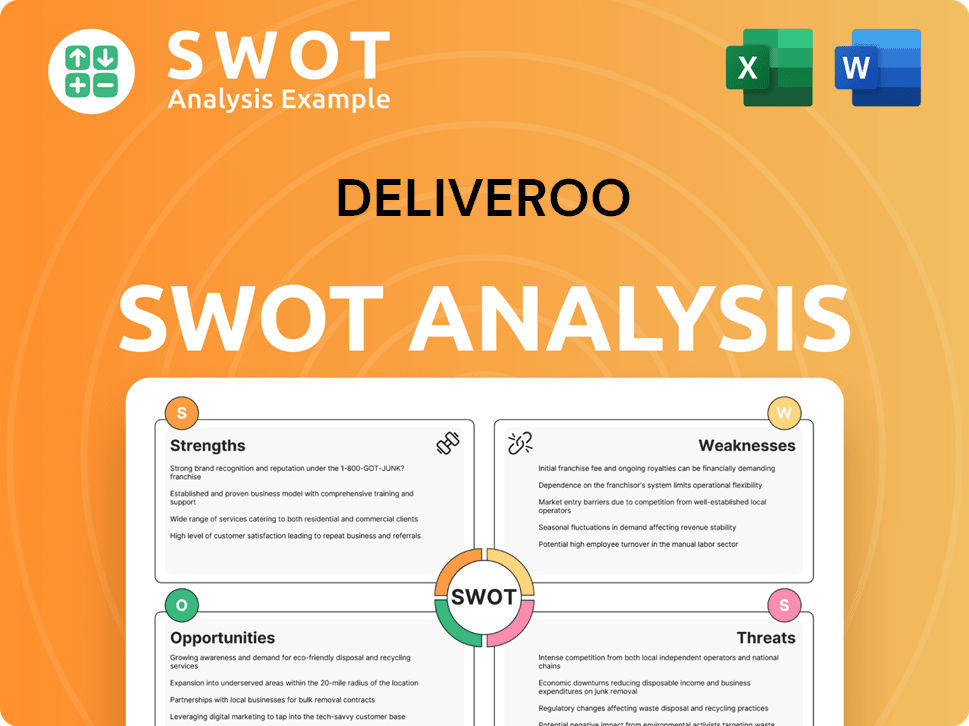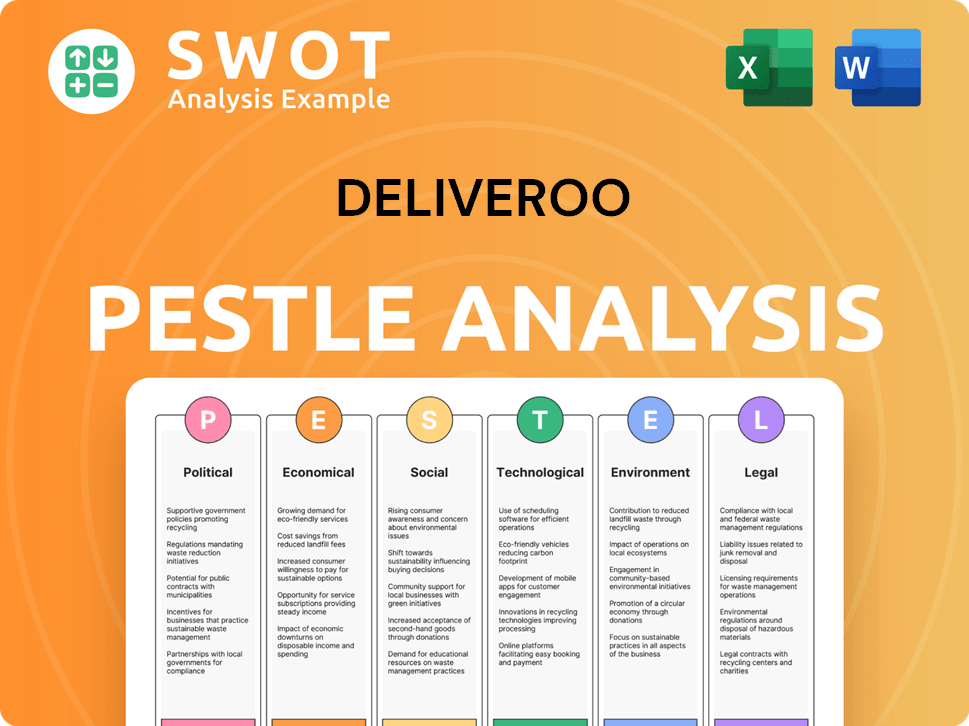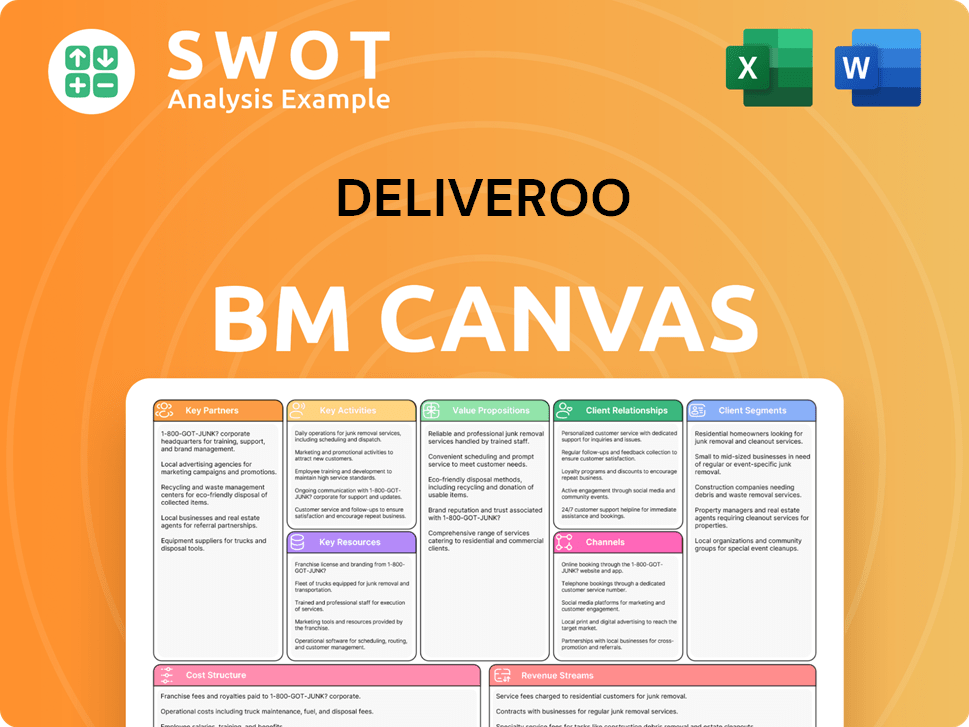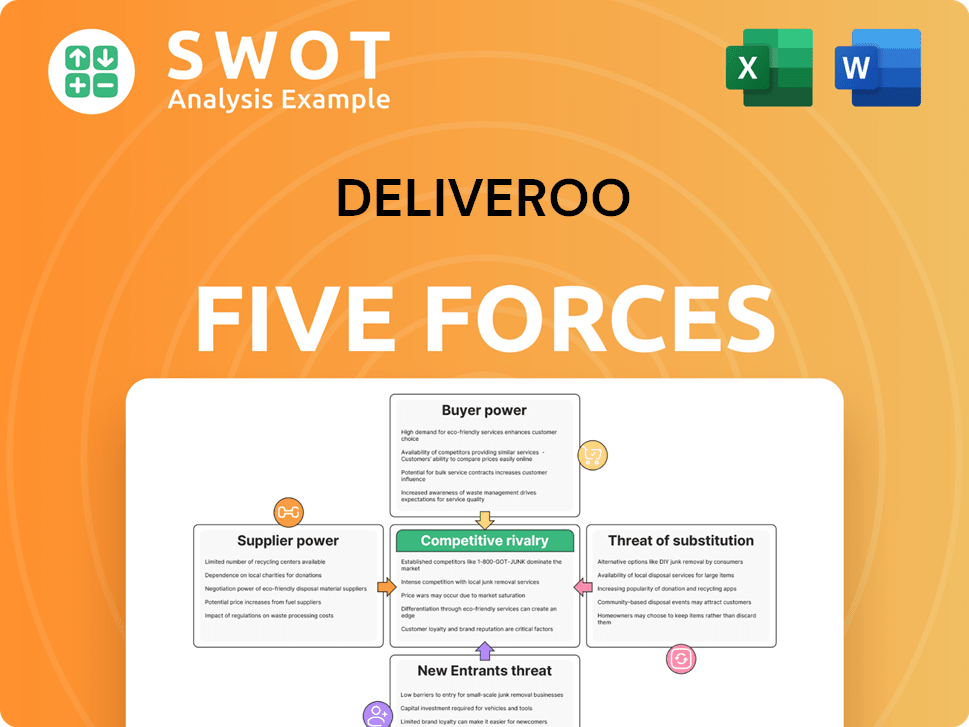Deliveroo Bundle
Who Really Owns Deliveroo?
Unraveling the intricate web of Deliveroo SWOT Analysis reveals more than just its market position; it unveils the very heart of its operations: its ownership. From its humble beginnings in London to its global presence, Deliveroo's journey has been shaped by a dynamic interplay of founders, investors, and public shareholders. Understanding the shifts in Deliveroo ownership is key to grasping its strategic direction and future potential.

The question of who owns Deliveroo is critical for anyone tracking the food delivery giant's performance. As a publicly traded entity, the Deliveroo company is subject to the influences of a diverse shareholder base, impacting everything from its expansion plans to its competitive strategies. This analysis will explore the evolution of Deliveroo's owner structure, including the initial stakes, key investors, and the current distribution of shares, providing a comprehensive view of the forces shaping its trajectory.
Who Founded Deliveroo?
The food delivery service, was founded in 2013 by William (Will) Shu and Greg Orlowski. This marked the beginning of the journey for the company, which has since become a significant player in the online food delivery market. Understanding the initial ownership structure provides insights into the company's early strategic direction and growth trajectory.
Will Shu, an American entrepreneur, conceived the idea after experiencing limited food delivery options in London. Greg Orlowski, a software engineer, co-founded the company and was instrumental in building its initial technology platform. While the exact equity split between the founders isn't publicly detailed, they held the foundational ownership.
In its early stages, the company attracted backing from angel investors and friends and family. These early supporters provided crucial seed capital that enabled the company to develop its platform and begin operations. Their investment was vital in getting the company off the ground.
The company was founded by Will Shu and Greg Orlowski.
Early funding came from angel investors and friends and family.
Specific equity percentages for the founders at inception are not publicly available.
The initial focus was on building the platform and establishing operations in London.
Greg Orlowski transitioned out of his active role in 2016 but remained a shareholder.
Early agreements likely included provisions such as vesting schedules for founder shares.
The initial ownership structure played a crucial role in shaping the company's early strategy. The founders' vision, focused on providing a premium food delivery service, guided the company through its formative years. For more insights into the company's strategic approach, consider reading about the Growth Strategy of Deliveroo. There were no widely reported initial ownership disputes or public buyouts among the co-founders in the early stages. As of 2024, the company operates in multiple countries, and its ownership structure has evolved significantly since its inception, with various institutional investors holding substantial stakes. The company's market capitalization and valuation have fluctuated, reflecting its growth and the competitive landscape of the food delivery industry. The company's journey from its founding to its current status involves multiple rounds of funding and strategic partnerships.
Deliveroo SWOT Analysis
- Complete SWOT Breakdown
- Fully Customizable
- Editable in Excel & Word
- Professional Formatting
- Investor-Ready Format

How Has Deliveroo’s Ownership Changed Over Time?
The Deliveroo company has seen significant shifts in its ownership structure, especially following its initial public offering (IPO) on March 31, 2021, on the London Stock Exchange. The IPO initially valued the company at approximately £7.6 billion, though market performance has fluctuated since then. Before the IPO, Deliveroo relied on venture capital and private equity funding rounds to fuel its growth.
Early investors in Deliveroo included prominent firms such as Index Ventures, Accel, and DST Global. A major pre-IPO investment came from Amazon, which led a $575 million funding round in May 2019, securing a significant stake. This investment was a key step in shaping the company's ownership landscape.
| Event | Date | Impact on Ownership |
|---|---|---|
| Initial Funding Rounds | Pre-IPO | Venture capital and private equity firms acquired significant stakes. |
| Amazon Investment | May 2019 | Amazon became a major shareholder, influencing strategic direction. |
| IPO on London Stock Exchange | March 31, 2021 | Diversification of ownership with institutional and individual shareholders. |
Post-IPO, Deliveroo's ownership structure evolved to include a mix of institutional investors, mutual funds, and individual shareholders. As of early 2024, major shareholders include T. Rowe Price Associates, Inc. and Fidelity Management & Research Company. Will Shu, the co-founder and CEO, remains a significant individual shareholder, holding around 6.3% of the shares as of March 2024. Amazon continues to hold a substantial stake, reported to be approximately 13.2% as of April 2024. These shifts reflect the transition of a company from private funding to public ownership, with institutional investors taking a more prominent role.
Deliveroo's ownership has evolved from venture capital to a mix of institutional and individual investors.
- Amazon remains a significant shareholder, impacting strategic decisions.
- Will Shu, the co-founder and CEO, retains a notable stake.
- Institutional investors like T. Rowe Price and Fidelity are major holders.
- The IPO marked a significant shift in the company's ownership dynamics.
Deliveroo PESTLE Analysis
- Covers All 6 PESTLE Categories
- No Research Needed – Save Hours of Work
- Built by Experts, Trusted by Consultants
- Instant Download, Ready to Use
- 100% Editable, Fully Customizable

Who Sits on Deliveroo’s Board?
The current board of directors for the company includes a mix of executive and non-executive directors. Will Shu, the CEO, serves as an executive director. The board also includes representatives from major shareholders and independent non-executive directors. This structure aims to balance executive leadership with independent oversight and the interests of major investors. The composition of the board can change, especially with shifts in significant shareholder positions.
The presence of independent non-executive directors is crucial for providing independent oversight. These directors are appointed to ensure good governance practices. The board's composition reflects the company's commitment to both operational expertise and independent governance, which is essential for a publicly traded company. The board's structure is designed to balance the interests of various stakeholders, including shareholders and the company's management team.
| Board Member | Title | Notes |
|---|---|---|
| Will Shu | Chief Executive Officer | Executive Director |
| Unknown | Non-Executive Directors | Represents major shareholders |
| Unknown | Independent Non-Executive Directors | Provides independent oversight |
Initially, the company used a dual-class share structure. This structure gave founder Will Shu enhanced voting rights. The dual-class structure expired 12 months after the IPO, converting all shares to a single class with one-vote-per-share. This change shifted voting power to a more equitable distribution among all shareholders. The company's shift to a standard one-share-one-vote system reflects broader trends in corporate governance. For more details, you can explore Revenue Streams & Business Model of Deliveroo.
The board of directors includes executive and non-executive members, ensuring a balance of expertise and oversight. Will Shu, the founder, is the CEO. The company previously used a dual-class share structure, which has since been converted to a one-share-one-vote system.
- The board includes representatives from major shareholders.
- Independent non-executive directors provide oversight.
- The dual-class share structure has been replaced with a standard voting system.
- The company is a public company.
Deliveroo Business Model Canvas
- Complete 9-Block Business Model Canvas
- Effortlessly Communicate Your Business Strategy
- Investor-Ready BMC Format
- 100% Editable and Customizable
- Clear and Structured Layout

What Recent Changes Have Shaped Deliveroo’s Ownership Landscape?
Over the past few years, the ownership structure of the Deliveroo company has been significantly shaped by its initial public offering (IPO) in March 2021. The company's share price fluctuations since the IPO have influenced the valuation of its shareholders' stakes. There haven't been any major announcements regarding share buybacks or secondary offerings recently, indicating a focus on operational performance and organic growth.
A key trend impacting Deliveroo's ownership is the evolving landscape of institutional investment. While Amazon continues to hold a substantial stake, the holdings of other institutional investors can vary based on market conditions, Deliveroo's financial performance, and wider industry trends. Founder dilution is a natural outcome of multiple funding rounds and the IPO, though Will Shu, the founder, still retains a notable percentage of the company. The company's efforts to achieve profitability and expand market share are crucial factors influencing investor sentiment.
| Key Ownership Aspects | Details | Recent Developments |
|---|---|---|
| IPO Impact | Initial Public Offering in March 2021 | Share price fluctuations affecting shareholder valuations |
| Institutional Investment | Involvement of institutional investors like Amazon | Shifting holdings based on market and performance factors |
| Founder's Stake | Ownership percentage held by founder Will Shu | Founder dilution due to IPO and funding rounds |
The food delivery sector is seeing a rise in institutional ownership as companies mature and go public. Environmental, social, and governance (ESG) factors are also becoming more important to investors, influencing their investment decisions. Although there have been no public statements about future ownership changes or potential privatization, Deliveroo's strategic direction and possible mergers and acquisitions (M&A) in the consolidating food delivery market could lead to further shifts in its ownership structure.
The ownership of Deliveroo has seen changes, especially after its IPO in 2021. Institutional investors and founder Will Shu have notable stakes. Market performance and industry trends affect these ownership dynamics.
Amazon is a significant Deliveroo owner. Other institutional investors adjust their holdings based on market conditions and company performance. ESG factors influence investor decisions.
Will Shu, the founder, continues to hold a significant percentage of Deliveroo. Founder dilution is a natural process with funding rounds and the IPO. His stake remains notable.
Deliveroo's strategic direction and the possibility of M&A activities could lead to ownership shifts. The company's profitability and market share are key drivers for investor sentiment.
Deliveroo Porter's Five Forces Analysis
- Covers All 5 Competitive Forces in Detail
- Structured for Consultants, Students, and Founders
- 100% Editable in Microsoft Word & Excel
- Instant Digital Download – Use Immediately
- Compatible with Mac & PC – Fully Unlocked

Related Blogs
- What are Mission Vision & Core Values of Deliveroo Company?
- What is Competitive Landscape of Deliveroo Company?
- What is Growth Strategy and Future Prospects of Deliveroo Company?
- How Does Deliveroo Company Work?
- What is Sales and Marketing Strategy of Deliveroo Company?
- What is Brief History of Deliveroo Company?
- What is Customer Demographics and Target Market of Deliveroo Company?
Disclaimer
All information, articles, and product details provided on this website are for general informational and educational purposes only. We do not claim any ownership over, nor do we intend to infringe upon, any trademarks, copyrights, logos, brand names, or other intellectual property mentioned or depicted on this site. Such intellectual property remains the property of its respective owners, and any references here are made solely for identification or informational purposes, without implying any affiliation, endorsement, or partnership.
We make no representations or warranties, express or implied, regarding the accuracy, completeness, or suitability of any content or products presented. Nothing on this website should be construed as legal, tax, investment, financial, medical, or other professional advice. In addition, no part of this site—including articles or product references—constitutes a solicitation, recommendation, endorsement, advertisement, or offer to buy or sell any securities, franchises, or other financial instruments, particularly in jurisdictions where such activity would be unlawful.
All content is of a general nature and may not address the specific circumstances of any individual or entity. It is not a substitute for professional advice or services. Any actions you take based on the information provided here are strictly at your own risk. You accept full responsibility for any decisions or outcomes arising from your use of this website and agree to release us from any liability in connection with your use of, or reliance upon, the content or products found herein.